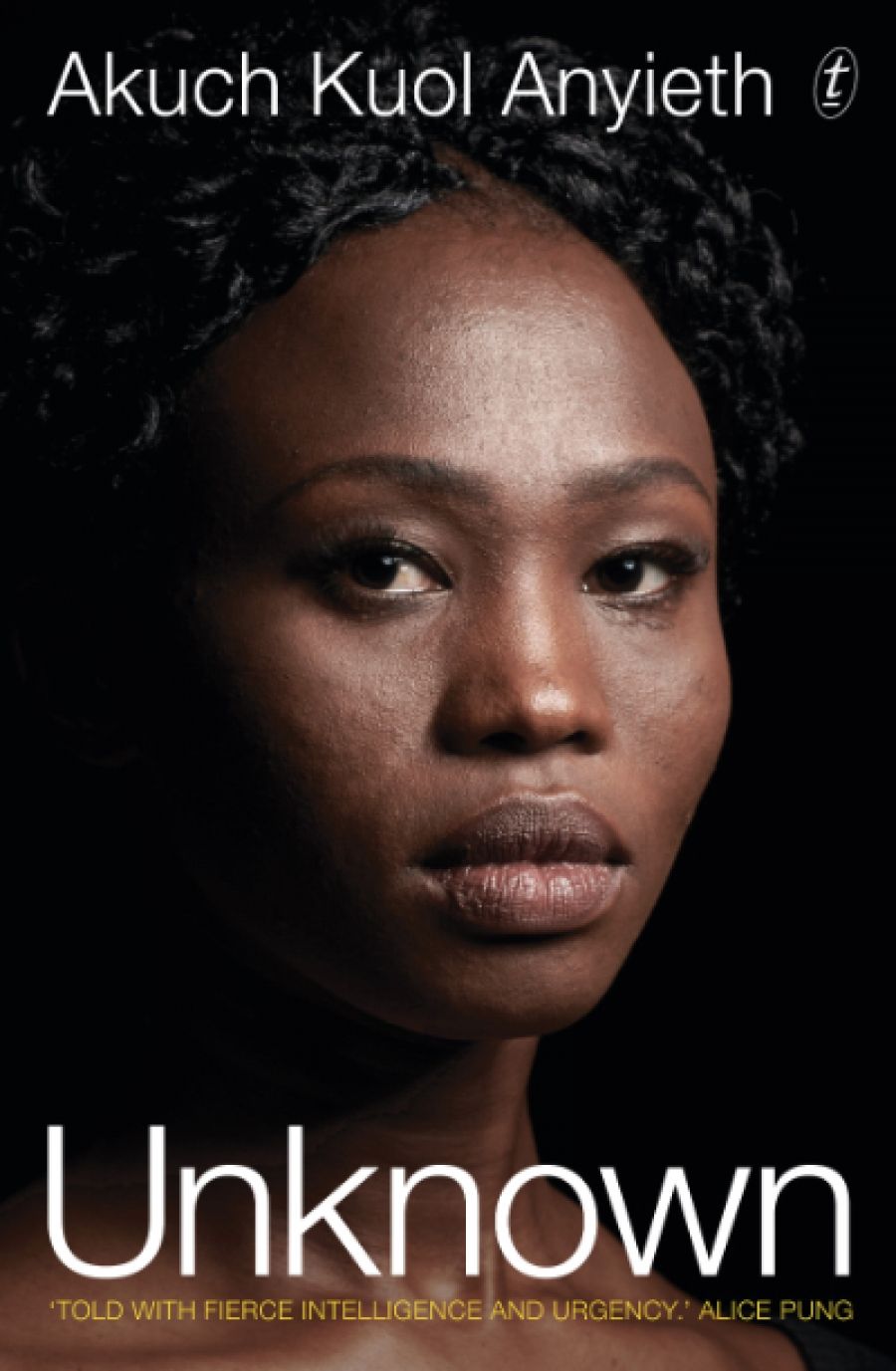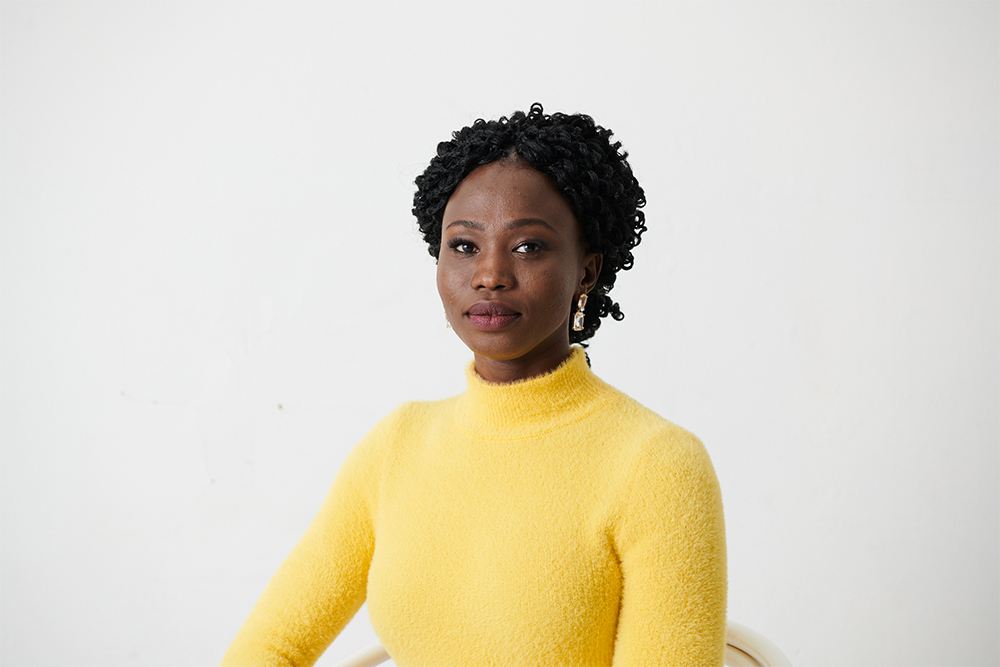
- Free Article: No
- Contents Category: Memoir
- Review Article: Yes
- Article Title: The mysterious child
- Article Subtitle: A memoir of violence and deracination
- Online Only: Yes
- Custom Highlight Text:
‘I want to tell you about a different kind of world, one that exists within the world we live in,’ writes Akuch Kuol Anyieth in her memoir, Unknown, thus inviting her readers to empathise with the singular plight of refugees. For much too long, refugees have been overlooked or rendered invisible; they are confined to refugee camps, detention centres, and hotel rooms, condemned to the margins of society, and denied entry to territories in order to seek safe haven. Anyieth’s endeavour, through the personal medium of the memoir, to foreground the lives and perspectives of refugees is admirable, given that it obliges her to relive past traumas. Unknown is a vivid, embodied portrait of Anyieth’s resilience and her will to overcome.
- Article Hero Image (920px wide):

- Article Hero Image Caption: Akuch Kuol Anyieth (photograph by Fred Kroh)
- Alt Tag (Article Hero Image): Akuch Kuol Anyieth (photograph by Fred Kroh)
- Featured Image (400px * 250px):

- Alt Tag (Featured Image): Nicholas Bugeja reviews 'Unknown: A refugee’s story' by Akuch Kuol Anyieth
- Book 1 Title: Unknown
- Book 1 Subtitle: A refugee’s story
- Book 1 Biblio: Text Publishing, $34.99 pb, 319 pp
- Book 1 Readings Link: booktopia.kh4ffx.net/AoNL4a
Anyieth was born in South Sudan (then Sudan) amid war on two fronts. In 1983, the second Sudanese civil war – fought by the Sudanese central government and the Sudan People’s Liberation Army (SPLA) – erupted after Sudan’s President Jaafar Numeiri imposed Sharia law across the country, and dissolved the Southern Sudan Autonomous Region. In the early 1990s, internecine ethnic conflict erupted between the Nuer and Anyieth’s Dinka tribes. Like many South Sudanese, Anyieth’s parents, Mary Achol Anyuon and Kuol Anyieth, were left with no choice but to relocate their growing family. Anyieth – whose first name, Akuch, translates to ‘unknown’ in the Dinka language – writes that she ‘was the mysterious child who defied all the odds to be born, and to survive displacement, poverty and violence’.
Mary sought sanctuary in the Kakuma refugee camp with her four children. Anyieth’s father, a sagacious man, ‘driven by his undying dream of defending his nation’, remained in Sudan to serve in the SPLA. What was a profound loss for his family was a gain for the South Sudanese cause. Located in north-west Kenya, the Kakuma refugee camp, established in 1992 by the United Nations High Commissioner for Refugees (UNHCR), hosted South Sudanese families fleeing conflict, as well as refugees from the Democratic Republic of the Congo, Somalia, Burundi, and Ethiopia. The promise of protection in the camp proved elusive: life was marred by malnutrition, disease, and senseless violence. ‘Kakuma was a place where dreams were impossible to pursue; simply surviving was hard enough,’ recalls Anyieth. Death was never a distant thought, as they waited ‘in the hope of one day migrating to a western country’.
Much of the violence that Anyieth and her family suffered was inflicted by one of her brothers. For large parts of Unknown he is known only as ‘Dragon’, a menacing and dehumanising sobriquet marking his descent into alcohol-fuelled brutality. ‘The stress Dragon had brought upon our family, especially Mama, was immeasurable, and her body bore the marks of it,’ writes Anyieth. In a particularly terrifying episode, Dragon – long enraged by the fact his sister Atong had given birth out of wedlock – hurled a machete in her direction with lethal intent. Trying in vain to defuse the situation, his loving mother Mary became a victim of Dragon’s frenzied attacks, so much so that ‘his fists and feet were covered in blood’. Anyieth writes of these near-death encounters with rare clarity and precision considering the distressing nature of such memories.
Anyieth, now a graduate researcher in crime, justice, and legal studies at La Trobe University, and author of the book South Sudanese Manhood and Family Crisis in the Diaspora (2021), is alive to the mental health crises afflicting refugees. ‘Dragon was not mentally ill – well, there was never an official diagnosis,’ she writes. In the battle to subsist, trauma and mental illness are undiagnosed, untreated. Often, the only refuge was alcohol. Mary, an unconditionally caring mother and bedrock of the family, would only drink ‘when she wasn’t sure where our next meal would come from’. Unknown provides a compelling call for greater psychological support, from mental health professionals, at the epicentres of refugee situations and in resettlement countries such as Australia.
In 2005, Anyieth and her family were finally resettled in Australia. Resettlement to developed countries is a long-term solution available to less than one per cent of the world’s refugees. ‘We were in paradise for sure,’ Anyieth enthuses on her arrival in Melbourne. It soon became apparent that resettlement could not serve as a panacea: Dragon’s violence remained rampant, and problems of social and economic integration arose. These matters were aggravated by a remiss white bureaucracy and emergency services that do not value Black lives. ‘I can’t tell you how much time we’ve wasted trying to save this guy’s life,’ one paramedic says within earshot of Anyieth, referring to her other brother Gai, whose life had taken a tragic turn. Amid all the tumult, Anyieth succeeds in her studies and work, and proves an indefatigable voice for her community – while working through her own issues of trauma and belonging in a foreign land. Indeed, she suggests that the cumulative traumas that so frequently beset refugees cannot be shed in an instant; rather, they are to be ameliorated over time, with the assistance of family, one’s own immediate community, and an inclusive society.
In May of this year, the UNHCR announced that an unprecedented 100 million people are displaced from their homes. Persecution, conflict, and war – rife in countries such as Afghanistan, Myanmar, South Sudan, Ukraine, Syria, and Venezuela – continue unabated. As Anyieth’s memoir demonstrates, it is the vulnerable and the victimised – mothers, children, the elderly – who are the most affected by systemic violence. Unknown is but the story of one person, and by extension, one family, uprooted by conflict and forced to weather the harshest conditions of privation, violence, and dislocation. Yet in moments of mass crisis, a solitary story can awaken and sharpen our sensitivity to the suffering and aspirations of others. Anyieth’s Unknown achieves precisely that, chronicling the life of an extraordinary young woman who has overcome.


Comments powered by CComment